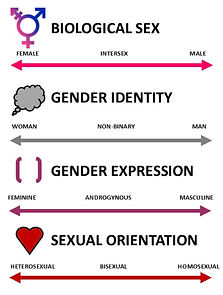
What Even Is Gender?
As this video talks about, every aspect of gender and even biological sex is incredibly complex and not binary like we were likely taught as children.
Gender is the social, psychological, cultural and behavioral aspects of being a man, woman, or other gender identity. Now some quick definitions to get out of the way before I begin my explanation.
Cis-gender/cis: someone who identifies with the gender identity that matches their assigned sex at birth
Transgender/Trans: someone who identifies with a gender identity that does not match their assigned sex at birth
When you think of your own gender, what do you think about? What are physical things that make you feel more secure in your own gender? Some people might feel like wearing dresses makes them feel more feminine, other people might not like wearing dresses and might feel that wearing jeans makes them feel more feminine. In either case, those people are doing things that are gender affirming for them.

The image to the left, gives a good idea of the different ways that a person can experience their feeling of gender. While gender identity is the only one that can determine what your gender is, the others can influence how you feel about your gender.
For example, the idea of gender that is expected from a straight man is different than what is expected of a gay man. Though, it is important to remember that sexuality doesn't equal gender, just that the societal expectation changes.
There are a lot of ways to be trans, just like there are a lot of ways to be cis. A transgender man can be typically masculine or more feminine and still be a man. A transgender woman can be a tomboy or hyper-feminine and neither gender expression is more valid, its just another way of being a woman.
There are also a lot more genders than trans woman and trans man. There are different identities that are sometimes referred to as non-binary and gender diverse identities. These are identities that people adopt when they don't feel as if man or woman is accurate to their internal experience of gender. Some non-binary people describe their identity as non-binary and others can use terms like gender-fluid, demi-gender, gender queer or many more terms. These terms have more specific meanings but ultimately the biggest thing to know with gender diverse individuals is that they should be referred to in the way that they feel most comfortable and that it is always ok to ask someone how they would like to be referred to if you don't know.
At the end of the day its important to know that transgender people are more like cisgender people than we are different from cisgender people. We are all people and we deserve to be treated with respect. It can be valuable even as a cisgender person to consider what your own personal experience of gender feels like to you.
